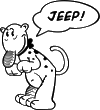More Eponymy
Here's an update on the post about brand names that become generic nouns. I started the list with the following:
Kleenex
Frisbee
Xerox
Jet-ski
Band-aid
Coke (down south)
Cuisinart
Kodak
Jeff added Tylenol and Aspirin.
Daniel offered Hoover and Jello.
Meghan suggested Chapstick.
All good examples.
The mention of Jell-o reminds me of the band Green Jellÿ that performed "Three Little Pigs" (remember the claymation video?). They originally spelled their name with the "o" but after a lawsuit was brought against them by Kraft Foods (probably largely because of their slogan "Green Jello Sucks!") in 1992 they changed it to a ÿ (notice the umlaut). They say the pronunciation is the same.1
I thought of a few more too.2
Jacuzzi
Q-tip
Vaseline
Walkman
Popsicle
Thermos
Quonset (Maybe too specialised a term. It's a type of shed made of corrugated sheet metal with a rounded roof. You see them on farms a lot. I learned the word living in North Dakota)
Mace - which can also be a verb.
Escalator
There are two main classes here. Some of these are still very much associated with a brand. Kodak may be occasionally used to mean a snapshot, but nobody is unaware that Kodak is a brand name. The same is true of Xerox and Q-tip. There are some however that have become so purely generic that many people can't even think of an alternative to the term. Jacuzzi is close but there's still hot tub or whirlpool (bath). Vaseline is close, but we do still know of the brand and it is usually capitalised. My favorite is escalator. I can't think of anything else to call them. ...lifty-stairs?
Jeep is on the fringe. It's an interesting example because it is sometimes used to describe any Jeep-like vehicle but there are so few that it almost always means the brand. It is especially connoted with the Wrangler model. Some might claim that the other models (the Grand Cherokee the Commander etc.) aren't really "jeeps"; they're SUVs. But now we have to move backwards with this example. The brand name Jeep came from the common military abbreviation G.P. for General Purpose Car - a completely generic description. But even this can be followed further back. There is a common claim among dictionaries that the power and nimbleness of the vehicles garnered them the nickname jeep in reference to Popeye and Olive Oyl's powerful and nimble friend "Eugene the Jeep." That could have happened as early as 1936 when the character was introduced as a gift to Olive. The order is hard to prove. The Thimble Theatre cartoons were popular at this time. It makes sense that when the soldiers noticed how much "G.P." sounded like "Jeep" they made the further connection. Making sense isn't enough to make it so. This may remain one of those pointless mysteries that only a nerd like me cares to solve.
in reference to Popeye and Olive Oyl's powerful and nimble friend "Eugene the Jeep." That could have happened as early as 1936 when the character was introduced as a gift to Olive. The order is hard to prove. The Thimble Theatre cartoons were popular at this time. It makes sense that when the soldiers noticed how much "G.P." sounded like "Jeep" they made the further connection. Making sense isn't enough to make it so. This may remain one of those pointless mysteries that only a nerd like me cares to solve.
1. Not to get too technical but this International Phonetic Alphabet diacritical usually indicates centralization (although the umlaut is commonly a process of fronting in Germanic languages). Assuming that the "y" indicates the "ee" sound it would actually sound very little like any English vowel. Saying "ee" while smiling is easy. Try saying "oo" while smiling. (The Navajo language does have a sound like this). A centralized "ee" would be somewhere between these. But if we consider the IPA symbol "y" we find that centralisation would be closer to an "oo" sound. The IPA "y" is like an "ee" with rounded lips - e.g. German flügelhorn. As these are high vowels they wouldn't sound much like the 'o' of Jello. That's a middle back vowel.
2. I have purposefully left out some commonly mentioned examples. Some brands have become so ubiquitous that the name is used generically - but the name is still used to name only objects of that brand. Pop-tart is rarely used for a pastry other than the one made by Kellogg's. I suppose small adhesive squares like Post-It Notes could be made by a lot of companies other than 3M - but I don't think I've seen many yet. Patents might be an issue with some of these. How can a generic product get the label if the generic product isn't even allowed to exist?




Thank you for mentioning Quonset. I've never thought about that word before, even though I've used it often.
ReplyDeleteIt's a good one. At first it sounds like an aboriginal name for a shed or a hut or a hogan of sorts. Algonquian glosses variously give the meaning of quonset as some sort of "place." I'm looking into it further - but it turns out the sheds were just named for the place in Rhode Island (Quonset Pt) where they were made. Usually used in the phrase "Quonset hut."
ReplyDeleteAlso apropos to my comments on Jeeps - Quonset huts were primarily military sheds in their early history.
I learned the word talking with Janice during a Pierre home-leave run.